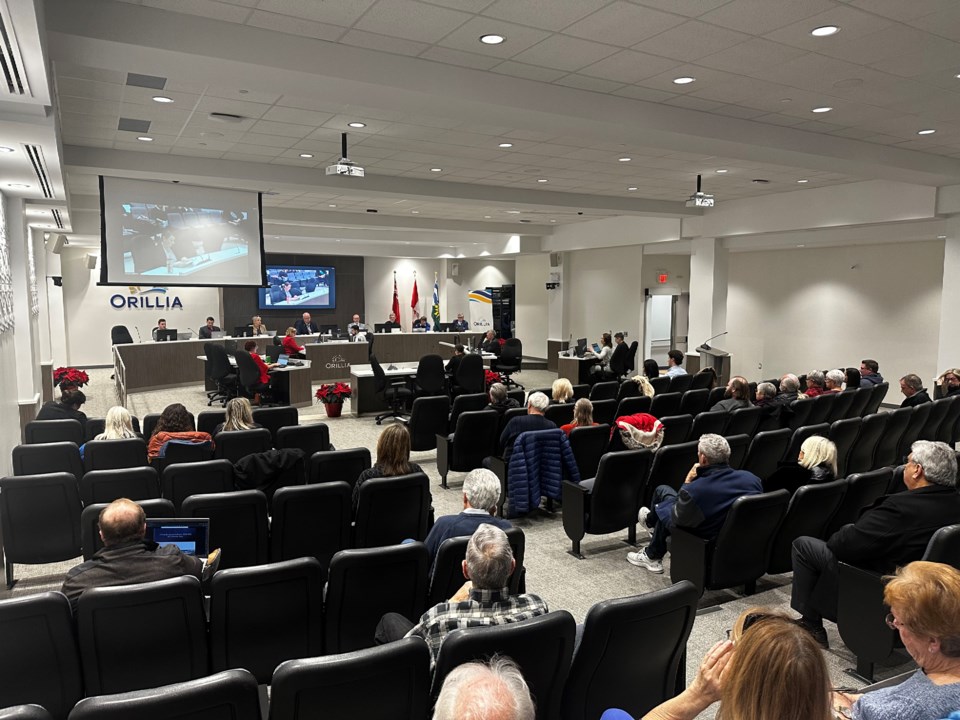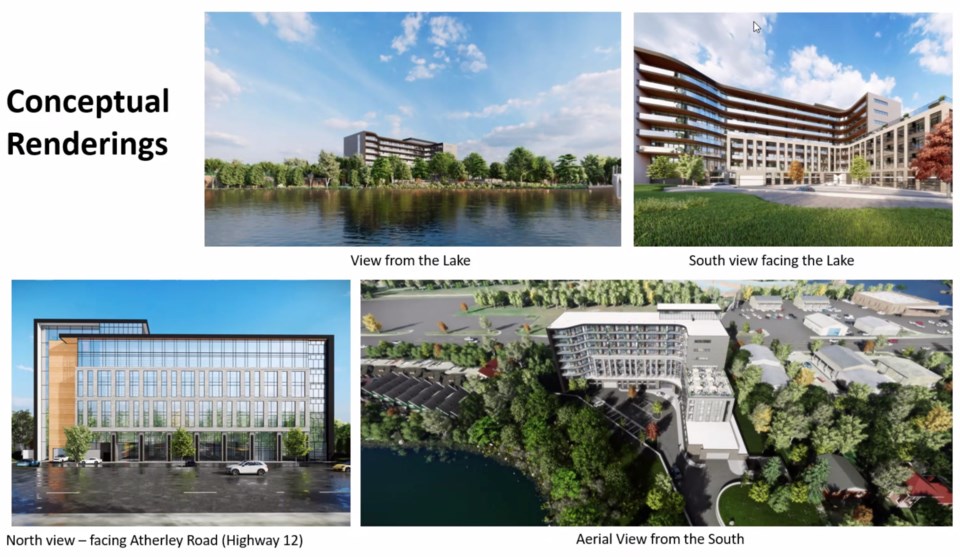Citing city council’s "failure to make a decision," a developer has filed a notice of appeal to the Ontario Land Tribunal (OLT) regarding a development proposed near Orchard Point.
According to a memo to city council, the appeal was filed on Jan. 19 by Coland Developments Corporation due to council’s failure to reach a decision on the proposed eight-storey development on Atherley Road “within the legislated timelines.”
In December of 2023, a few days after a well-attended public meeting, city council deferred zoning bylaw amendments for the controversial eight-storey development.
Dozens of residents attended the public meeting on the developer’s zoning requests, raising concerns about its potential environmental effects with regard to tree removal and stormwater runoff, incompatibility with the lower-rise neighbourhood, effects on traffic in the busy area, and more.
Situated on properties spanning between Atherley and Driftwood roads on Orchard Point, developers proposed an L-shaped, 45-unit condominium development starting at four storeys near Driftwood Road, and climbing to eight storeys along Atherley Road.
Coland, represented by WSP Canada, sought zoning amendments to permit an eight-storey structure where four is currently allowed, to permit a parking lot adjacent to Lake Simcoe, and to permit a reduced interior side-yard setback of 2.6 metres from a slightly raised underground parking facility.
“An eight-storey building is obviously too big for this location. That is why they’re asking for variances and site accommodations as well as rezoning. It just doesn’t fit,” resident Lance Anderson said at the public forum. “This development is disruptive and incompatible with this neighbourhood.”
Natalie Boodram, WSP planner, argued at the December public meeting that the city’s Official Plan, which designates the land as an intensification area, supersedes the site-specific zoning restrictions in place.
“It’s above the zoning bylaw, and the zoning bylaw is required to conform with the Official Plan, not the other way around,” she said. “The permissions that we are applying for through the zoning bylaw amendment is to be consistent with the Official Plan, (which) allows eight storeys as the maximum height.”
Ali Chapple, a senior planner with the city, also stated the subject land is within a designated intensification area and is not set to be included in the “down designation” planned for Orchard Point.
“These lands were already up-zoned for increased density more than 25 years ago, which was prior to the designating of Orchard Point (as an intensification area),” she said. “As such, the planning division has not included these lands in that review or that proposed removal.”
A majority of council members shared concerns about the project and voted to defer approval of the zoning bylaw amendments, requesting the developer reconsider a lower building height and density, and consider limiting vehicular access to solely emergency or service vehicles along Driftwood Road.
At the time, council was warned an appeal might be forthcoming.

“This application has been on the books for quite a period of time, so it’s already into a time frame where the developer has a right to appeal a non-decision,” said Ian Sugden, the city’s general manager of development services and engineering. “A deferral will just cement the opportunity for an appeal based on a non-decision.”
And now, the appeal has been filed.
“More than 900 days have passed since the (zoning bylaw) application was deemed complete and more than 365 days have passed since the (site-plan) application was deemed complete,” notes the appeal filed on behalf of the developer by J. Pitman Patterson of Borden Ladner Gervais LLP, a Toronto law firm.
“City council has failed to make a decision regarding the applications,” concludes the appeal.
In its 18-page appeal documents, the developer recaps the lengthy process, its plan for the site and its attempt to mollify local concerns.
The developer contends its applications are “consistent with the Provincial Policy Statement (PPS) (that) directs planning authorities to identify appropriate locations and promote intensification and redevelopment where it can be accommodated and integrate transportation and land use considerations. The applications are consistent with such policies.”
It claims the applications also conform to A Place to Grow: Growth Plan for the Greater Golden Horseshoe.
“Orillia is identified as a primary settlement area within the Simcoe sub-area,” notes the appeal. “The Growth Plan prioritizes intensification and higher densities in strategic growth areas to make efficient use of land and infrastructure and support transit viability. The applications respond to this direction and will support the achievement of complete communities.”
In addition, the appeal claims the developer's zoning applications “conform to the Lake Simcoe Protection Plan. The proposed development will maintain the 30-metre natural buffer area along Lake Simcoe. The proposed development includes a wooden boardwalk path within the 30-metre buffer area, as requested by the City of Orillia,” notes the appeal.
“Coland has submitted shoreline protection plans, environmental impacts statements (including species at risk analysis), tree preservation plans and arborists reports in support of the proposed development in conformity with the Lake Simcoe Protection Plan,” notes the appeal.
The developer’s applications for zoning changes also “conform to the city's Official Plan as it, among other matters, responds to policies that encourage complete, healthy and sustainable communities, promoting adequate housing supply, and directing growth to locations within the built-up area,” contends the appeal.
“The applications constitute good land use planning as, among other things, all technical issues (including transportation, servicing, natural heritage and lake protection) have been adequately addressed through the submission of revised studies,” it notes.
“A City of Orillia staff report dated Nov. 30, 2023 concluded that the (zoning bylaw) application is consistent with the PPS, conforms with the Growth Plan and the City of Orillia Official Plan, and is in compliance with the general purpose and intent of the city’s zoning bylaw,” notes the appeal document.
At the December council meeting in which council opted not to make a decision, Coun. David Campbell expressed concern about the move.
“I’ve literally woken up in the middle of the night thinking about it. I know what I’m saying isn’t popular. That’s putting it mildly. But in the end, if we, as a council, oppose this without what I will call legal planning grounds, the developer will most likely appeal it,” he said.
“That appeal would most likely be successful, and what it would do in the end is cost the taxpayers of Orillia money in fees and possible penalties.”
In its memo to city councillors, dated Jan. 26, staff noted council "will receive both an open and closed session report from city staff advising as to their options on how to deal with this appeal. Please note that direction and advisement on legal matters before the city are to be kept confidential in nature," it concluded.
– With files from Greg McGrath-Goudie
